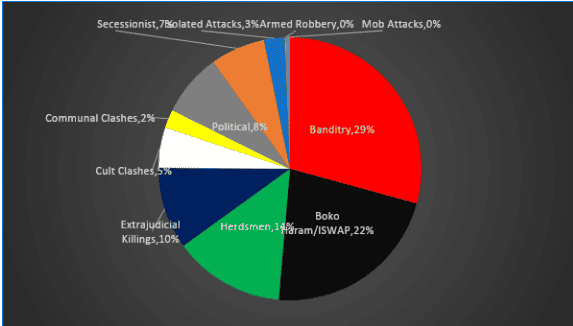Nigeria is grappling with a deeply entrenched security crisis that has led to an alarming level of violence and instability across the nation. Over the past four years, from October 1, 2019, to September 30, 2023, Nigeria witnessed a harrowing 55,910 deaths and the abduction of 21,621 individuals across nearly 10,000 attacks. These figures, presented in a recent report by The Observatory of Religious Freedom in Africa (ORFA), reveal the scale and severity of the violence plaguing the country, underscoring the dire need for effective and coordinated responses to safeguard Nigerian citizens.
The ORFA report provides a comprehensive analysis of the violence, highlighting the systematic targeting of religious communities. It documents a total of 11,610 distinct attacks resulting in either killings or abductions, or both. A significant number of these incidents—8,905—were characterized by killings without accompanying abductions, while 1,065 involved both killings and abductions, and 1,640 involved abductions without killings. This data translates to an average of eight attacks per day over the four-year period, reflecting the persistent and pervasive nature of the insecurity affecting Nigerian society.
 The report paints a grim picture of the situation on the ground. Many civilians live in constant fear, facing the threat of sudden and violent attacks. Eyewitness accounts included in the report describe children being forced to sleep in trees at night as a desperate measure to evade attackers. The toll on civilians is immense: out of the 30,880 civilian fatalities recorded, many were targeted simply for their religious beliefs or ethnic identity. The remaining 25,030 fatalities were members of security forces or various terror groups, indicating that the violence also significantly impacts non-civilian populations.
The report paints a grim picture of the situation on the ground. Many civilians live in constant fear, facing the threat of sudden and violent attacks. Eyewitness accounts included in the report describe children being forced to sleep in trees at night as a desperate measure to evade attackers. The toll on civilians is immense: out of the 30,880 civilian fatalities recorded, many were targeted simply for their religious beliefs or ethnic identity. The remaining 25,030 fatalities were members of security forces or various terror groups, indicating that the violence also significantly impacts non-civilian populations.
The abductions are equally alarming, with 21,532 civilians abducted in 2,670 attacks. Among these abducted civilians, a smaller number—89—were identified as members of security forces or terror groups. This data suggests that the primary targets of these abductions are ordinary citizens, further highlighting the vulnerability of the civilian population amidst the ongoing conflict.
A striking revelation from the ORFA report is the high proportion of Christian victims compared to those of other religious affiliations. Of the 30,880 civilians killed, 16,769 were identified as Christians, while 6,235 were Muslims. Additionally, 11,185 Christians were abducted compared to 7,899 Muslims. The report also notes the deaths and abductions of individuals practicing African Traditional Religions, with 154 killed and 184 abducted. However, the religious affiliations of 7,722 of those killed and 2,264 abducted remain unknown, underscoring the challenges in accurately identifying victims in such a chaotic environment.
When considering the religious demographics of the affected areas, the report finds that Christians are disproportionately targeted. In regions with significant Christian populations, the ratio of Christians to Muslims killed rises dramatically to 6.5:1, and the ratio of Christians to Muslims abducted is 5.1:1. These ratios highlight the targeted nature of the violence against Christian communities, raising concerns about religious persecution and the potential for deepening sectarian divides.
The violence is not limited to any single group or region but involves a complex interplay of various actors, including Islamist extremists, ethnic militias, and criminal gangs. Notably, the report singles out the Fulani Ethnic Militia (FEM) for their role in the ongoing violence. This group, relatively unknown outside Nigeria, is reported to have committed mass killings multiple times a year, particularly in the North Central Zone and Southern Kaduna. These areas, already fraught with ethnic and religious tensions, have become hotspots for violent clashes, often leaving civilians caught in the crossfire.
The ORFA report emphasizes that despite the widespread nature of these attacks, Nigerian military and security forces often seem unable to prevent or effectively respond to them. The report suggests that while the military is occupied with distant targets, terror groups and militias operate with relative freedom in other parts of the country. This situation has allowed violent actors to exploit the security vacuum, leading to unchecked atrocities against civilians.
The complex and multifaceted nature of Nigeria’s security crisis requires a nuanced understanding and a coordinated approach to address the underlying issues driving the violence. The ORFA report is a stark reminder of the human cost of this ongoing conflict and the urgent need for national and international efforts to restore peace and security to Nigeria. With over 55,000 lives lost and more than 21,000 individuals abducted, the crisis not only threatens the fabric of Nigerian society but also poses significant challenges to regional stability in West Africa.




